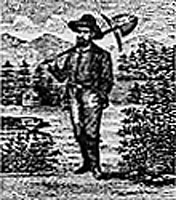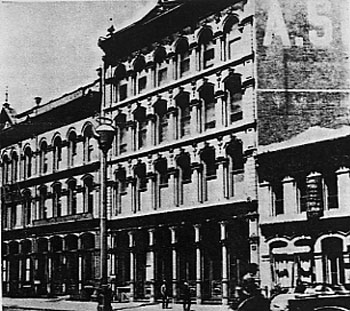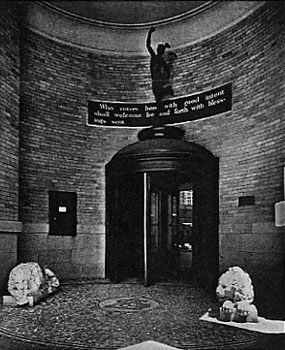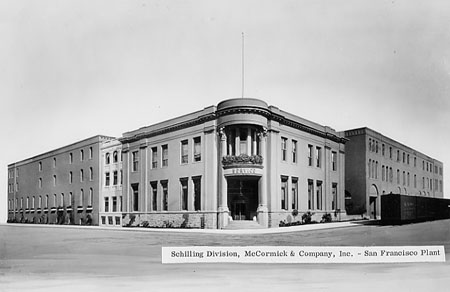Sixty Five Years of A. Schilling & Company
DANIEL G. VOLKMANN
SAN FRANCISCO, CALIFORNIA, MCMLIX
For the interest of the founder's descendants herein is presented
a brief history of A. SCHILLING & COMPANY 1881 - 1947
|
|
AUGUST SCHILLING arrived in San Francisco from Germany in 1870 at 16 years of age and soon entered the service of J. A. Folger & Co. Schilling’s great drive, initiative and intelligence won him early recognition. About the time he became legally of age, he was made a partner in the business, and the firm name was changed to Folger, Schilling & Co.
Late in 1879 George F. Volkmann was employed by Folger, Schilling & Co. as shipping clerk and soon attracted the attention of the partners. In 1881 Folger and Schilling decided to separate. Each of them offered Volkmann a partnership and he accepted Schilling’s offer. Folger continued the business and resumed the firm name of J. A. Folger & Co., under which it operates to this day.
The partnership of A. Schilling & Company was formed on September 8, 1881, with August Schilling having a two-thirds interest. At that time both men were 27 years old, having been born in or near Bremen, Germany, in February 1854. However, they were not known to each other while there.
Their first business location was at 122 Davis Street, San Francisco, where they engaged in the processing of coffee, tea, baking powder, spices, extracts and some other unrelated products which they supplied to the grocery trade. Many grades were offered and, as was the custom of the time, all were adulterated in varying degrees. For example, coffee was mixed with chicory, tea was artificially colored, cinnamon was mixed with almond shells, etc. However, their Pioneer Baking Powder was pure, consisting of refined grape cream of tartar and English bicarbonate of soda. The label on the can pictured a typical miner of 49er days bearing a pickax on his shoulder. bicarbonate of soda. The label on the can pictured a typical miner of 49er days bearing a pickax on his shoulder.
The business grew apace and larger quarters were required. They moved to a four-story building and basement near the corners of Market, California and Drumm Streets at 108-112 Market Street. The office entrance was on Market Street, and receiving, shipping and factory entrance on California Street. At the curb on Market Street the firm erected a hollow 30-foot pole on the top of which was placed a large copper teakettle. The steam pouring out of its spout created a sight that attracted the attention of all passersby. After many years the city government deemed it a hazard and ordered it taken down.
As soon as the firm felt sufficiently well established, it decided to make a radical departure from custom and offer a full line of unadulterated products of highest quality consistent with economy. The brand name of "Schilling’s Best" was chosen. It was not until long afterward, in 1906, that the Federal Government passed the Pure Food and Drug Act, requiring that the contents of packaged food be stated correctly on the label, as A. Schilling & Company had pioneered years before. Sale of the "Schilling’s Best" brand was so successful that before many years all other brands were discontinued and the standard of highest quality was rigidly adhered to throughout the years. Bulk coffee and tea were continued for many years, when they, too, were discontinued.
 |
A reduced copy of the firm's first newspaper advertisement which appeared in the San Francisco Chronicle on September 25, 1881, only 17 days after it started in business.

By the time it was decided to launch the new brand— Schilling’s Best, a large sale had been developed for Pioneer Baking Powder and as it fully conformed in quality to the high standard set, its name was changed to Schilling’s Best Pioneer Baking Powder. To further link it with the former Pioneer brand, the picture of the miner shown above, which was on the Pioneer label, was put on the new label. Later both the word Pioneer and the picture were discontinued. |
Another innovation started by the young firm was the closing of the office during the noon hour. This custom was adopted by other wholesale houses and is still generally observed. On the office door, which was locked during the noon hour, was posted a sign which read:
"A time to work,
A time to rest,
A time to eat your meal with zest.
This office is closed between 12:00 Noon and 1:00 PM."
Prepared baking powder was comparatively new and its usage grew rapidly. The firm of Schilling was particularly successful in the sale of this product and for many years baking powder was the backbone of the business, representing the largest portion of the sales and gross profit dollar. The baking powder trust (Royal, Dr. Price's, Cleveland) was very aggressive. Around 1895 it started the Argonaut Tea and Spice Co. on Main Street in San Francisco about half a block from the Schilling plant and lured a number of key employees away, but the venture came to grief in a few years and was discontinued.
It was at this time that John Wanamaker, famous department store merchant of New York and Philadelphia, inaugurated a "money-back guarantee" whereby a dissatisfied customer could return the purchase and have his money refunded. The idea was quickly adopted by A. Schilling & Company, who carried it a step further. Schilling presented it this way: "Your money back if you don't like Schilling’s Best. Just tell your grocer who will refund your money. You keep the goods." For many years slips were enclosed in all shipping containers for the convenience of grocers in obtaining reimbursement for money-back payments.
On April 23, 1897, Charles Flammer entered the service of A. Schilling & Company as office boy and remained with the firm for the following 50 years, retiring on May I, 1947, as Vice President and Treasurer.
A system of coupons placed in all packages of Schilling’s Best was inaugurated. In return for these coupons consumers received small, attractive booklets and cards, such as wedding albums, "creeping babies," etc., inscribed with sentimental verses. These became so popular that the company was reputed to receive the largest amount of mail in San Francisco. Although permanently discontinued at the time of the great fire of 1906, coupons were redeemed for many years thereafter.
In 1903 the firm erected its own factory and office buildings at the southeast corner of Second and Folsom Streets, on a lot 275 feet square. The new plant was dedicated on December 1, 1903, with a dinner in the shipping court to which all salesmen and key office workers were invited.
Rudolph Schilling, second son of August Schilling, started with the firm at this time.
 |
Premises occupied by A. Schilling & Company
at 108 Market Street from about 1886 to late 1903.
Note the pole with teakettle. |
Before 1900 a uniform red label with white lettering in Caslon type and gold borders was adopted for all Schilling’s Best consumer packages. A few years later the word arrangement was changed, putting the commodity in bold letters at the top of the front label, the net contents at the bottom and the brand name in smaller type in the middle—but continuing the red background and gold borders. A dignified, handsome package, designed from the customer's viewpoint, the simplicity and beauty of which reflected quality. This arrangement was continued through 1946.
Effective December 1, 1905, the partnership of August Schilling and George F. Volkmann was changed to a corporation, with 10,000 shares of capital stock and no change in ownership.
On the historic day of April 18, 1906, San Francisco was visited by a severe earthquake, which precipitated the fire that ruined a large part of the city. The entire plant  of A. Schilling & Company was destroyed and only remnants of the brick walls were left standing. Fortunately, at this moment August Schilling was in the East on his way to Europe. As it was impractical to process Schilling products in San Francisco, Schilling started a factory in New York and arrangements were made to process the balance elsewhere. For example, coffee was processed in Closset and Dever’s plant in Portland, Oregon. White paper with black type was used for labels, which read: "Schilling’s Best— the Best we are able to do after the Fire." of A. Schilling & Company was destroyed and only remnants of the brick walls were left standing. Fortunately, at this moment August Schilling was in the East on his way to Europe. As it was impractical to process Schilling products in San Francisco, Schilling started a factory in New York and arrangements were made to process the balance elsewhere. For example, coffee was processed in Closset and Dever’s plant in Portland, Oregon. White paper with black type was used for labels, which read: "Schilling’s Best— the Best we are able to do after the Fire."
In San Francisco, on the day after the fire, George F. Volkmann took steps to rebuild the plant and the business. The office was temporarily established in the basement of his home at 2307 Broadway. As soon as the brick walls had cooled and were cleansed, approximately half of the factory area was covered with metal roofing. This provided temporary housing for the employees while new buildings were being erected on the rest of the site. When this phase of the rebuilding program was completed and the new structures occupied, work was commenced on the remaining areas. Rebuilding lasted for about a year and during this period goods processed in New York and elsewhere were shipped to San Francisco for distribution.
William G. Volkmann, older son of George F. Volkmann, started with the firm in 1906 immediately after the fire.
After August Schilling had returned from New York late in 1906, he experimented with a business system, which he termed the "New Way." However, it was abandoned a few years later.
In September 1909, Daniel G. Volkmann, younger son of George F. Volkmann, started in the business.
The introduction of the vacuum can marked a revolution in food processing that made it possible to package coffee, roasted and ground, so that it remained fresh for extended periods of time. In 1912, A. Schilling & Company decided to package coffee in vacuum cans and to limit the line to one grade only, roasted and ground. Schilling’s Best One Star, Two Star, Three Star, Four Star and Five Star were discontinued. As time went on, both the machinery for drawing the vacuum and the type of can used were improved. In 1926 the present collar-type vacuum cans and new machinery which was able to draw a uniform vacuum of about 28 inches were introduced.
 |
Entrance Rotunda A. Schilling & Company, 1907
Southeast corner Second and Folsom Streets
Over the entrance is a winged statue of Mercury,
the Roman God of commerce. |
So each would own one-half of the total stock, August Schilling sold to George F. Volkmann a one-sixth interest in the corporation on January 1, 1918. The price paid was $200.00 per share—$ 100.00 in cash and $ 100.000 in stock, figured at cost plus 6% interest, of certain salt and land companies in which they had jointly invested.
With the advent of national prohibition, the corporation made every effort to avoid the sale of its flavoring extracts for drinking purposes. Each dealer was required to sign a pledge to sell extract for culinary purposes only. Although orders which appeared to be too large for the customer's business were canceled, extract sales increased during this period.
All other brands having been eliminated, the brand name "Schilling’s Best" was deemed misleading and it was decided to label all packages "A Schilling Product."
Spices were sold in plain cans which had paper labels and were wrapped—the wrapper was essentially a facsimile of the label and was designed to keep the container clean and unsoiled until it reached the kitchen. Starting in 1922, the labels were lithographed directly on the spice cans.
Miner Chipman, an Eastern business efficiency consultant, was engaged early in 1923. His recommendations resulted in a change in organizational structure, rearrangement of the office facilities, and the construction of an office annex. Chipman remained with the company until 1925.
In 1923 Rudolph Schilling, general manager, withdrew to devote his full time and attention to the interests of the Schilling Estate Co., of which he became President.
In 1923 and 1924 sales quotas and corresponding expenses were increased but the anticipated sales increases did not materialize. As a result, the corporation suffered a loss in 1925 and expenses had to be trimmed.

To meet competition and to improve service, warehouse stocks of the larger volume items were carried in strategically located cities. By 1946 such stocks were in public warehouses in Seattle, Portland, Salt Lake City, Butte, Denver, El Paso, Amarillo, Fargo and in Los Angeles, where the company leased the building and its own employees handled the stock.
In 1927 whole spices in small cartons and seasoning salts in 1 1/2-ounce bottles were added to the line. Two years later, on September 1, 1929, A. Schilling & Company entered into an agreement with J. A. Folger & Co. for the purchase of their spice and extract line under a plan of payment based on the amount of business actually transferred to them. Schilling sold Folger’s Golden Gate brand of spices and extracts until the end of 1932. Since Schilling and Folger enjoyed so much of the spice and extract business of Safeway Stores, the company succeeded in having them feature Schilling spices and extracts almost exclusively.
Prepared Mustard Sauce, in 4-oz., 8-oz. and 1-gallon glass jars, was added in 1929, but in 1933 6-oz. glass jars were introduced and the 4-oz. and 8-oz. sizes discontinued.
Clarence E. Miller, who had some 25 years’ experience with the H. J. Heinz Co., was engaged by A. Schilling & Company on December 1, 1930. He served in several capacities, rising to general manager and finally, President.
On September 8, 1931, A. Schilling & Company commemorated its Golden Anniversary. When the two founders arrived at the office, they were greeted by a display of beautiful golden flowers. Charles Flammer, representing the employees, read and presented to each founder a beautiful memorial book that he had written. The book was bound in handsome leather and was printed by the distinguished Grabhorn Brothers.
During 1932, A. Schilling & Company added a separate and finer grind of coffee—Drip Coffee—packed in vacuum cans. Henceforth, Schilling coffee was sold in two separate grinds —Regular and Drip.
Whole spices were being sold in quite small cartons and had only a limited sales volume. On June I, 1933, the size and contents of the cartons were increased with little change in price. This move proved to be an effective stimulant to sales and, by 1946, Schilling’s package shipments of whole spices were more than double the 1932 volume. Similarly, in October 1934, by eliminating the individual carton and effecting other economies, seasoning salts containers were enlarged from 1 1/2 to 3 oz. with no corresponding price increase. By 1946, the dollar volume of seasoning salts exceeded the total sales of ground spices that were transacted in the year prior to their addition.
On August 1, 1934, August Schilling, founder and extraordinary business genius, died. Thus ended a unique and ideal association of two capable, energetic and dynamic men who had shared in all their business ventures for 53 years; who had lunched together every business day if possible, at which times their business problems were discussed and resolved; who never let any policy disagreement interfere with their complete confidence in each other; and who always addressed each other as mister.
August Schilling had transferred his stock in the company to the Schilling Estate Co. An arrangement was effected on August 15, 1935, for its purchase at a price equivalent to the value determined by the State of California for inheritance tax purposes. About 40% of the stock were purchased by key employees and the balance by members of the Volkmann family. The employees were assisted in financing purchases by the company under a plan which provided for a down payment and monthly installments plus interest at 4% per annum on balances, all dividends to be paid to the company until the loan with interest was paid in full.
Effective January 1937, and thereafter, Daniel G. Volkmann served the company without salary.
The corporation of A. Schilling & Company was dissolved on December 31, 1940, and thereafter the business was continued as a partnership with no change in ownership.
With the spread of the Second World War, tin plate became scarce and a change in the packaging of coffee became necessary; thus, during 1943 and through late 1946, glass jars were used for vacuum packed coffee.
Due to the war, many spices were in short supply and prices soared. Pepper, especially, was difficult to obtain and imitations appeared on the market, though no good substitute was ever developed. It became necessary to limit the sale of pepper so in 1946 it was sold in 2-oz. packages only, at increased prices, and pepper sales declined from 1,623,033 pounds in 1942 to 340,299 pounds in 1946.
After undergoing a lung operation, William G. Volkmann died on March 23, 1944, and prematurely ended his long and valuable service to the company.
With the march of time the sale of bread and bakery products by route wagons, and in stores, increased greatly, resulting in a heavy decline in home baking and in the sale of baking powder. The manufacture and sale of Schilling Baking Powder was discontinued at the close of 1945.
On December 9, 1945, cofounder George F. Volkmann died. Though he had not taken an active part in the management of the business for many years, his valuable advice and counsel were always available and often used.
The partnership was dissolved on December 31, 1945, and the business was resumed as a corporation on January 1, 1946, with 20,000 shares of Capital Stock, of which 16,000 were issued without change in ownership.
The selling of Schilling products direct to the grocery trade was accomplished through route salesmen who lived in the territory they served. At the end of 1946 about 100 salesmen covered nearly all of the United States west of the Mississippi River, including Alaska and Hawaii.
In this brief recital no attempt is made to describe the various sales and advertising campaigns conducted during the years. Every year a large sum was budgeted for advertising, including newspapers, billboards, store display material, package inserts, store demonstrations, and other promotional media.
Early in 1947 an inquiry from McCormick & Company, Inc., of Baltimore was received through Dean Witter & Company, stating they would be interested in buying A. Schilling & Company if a sale of the business would be considered. Many meetings were held at which the company was represented by Daniel G. Volkmann, assisted by Jean C. Witter and Hillyer Brown, attorney, and a sale was agreed upon as at December 31, 1946. After payment of broker's and attorney's fees, each stockholder received $ 198.58375 per share.
Although the usual guarantees as to correctness of facts and figures were included in the Bill of Sale, never was any point questioned, either written or orally, for discussion or clarification.
The Board of Directors and Officers of the Corporation on December 31, 1946, were:
DANIEL G. VOLKMANN, Chairman of the Board
CLARENCE E. MILLER, President
CHARLES FLAMMER, Vice President and Treasurer
WILLIAM G. VOLKMANN, JR., Secretary
DR. MILES GRIFFIN, Director
JOHN H. BOSCHE, Director
MISS JOHANNA M. VOLKMANN, Director
Below is given an abridged Record of Sales in units (early years not available):
| Year |
Coffee
in lbs. |
Tea
in lbs. |
Baking
Powder
in lbs. |
Spice*
in lbs. |
Extract
in pints |
Mustard
Sauce
in lbs. |
Total
Dollars |
| 1909 |
1,440,950** |
747,012** |
2,045,023 |
443,323 |
80,216 |
- |
2,022,519 |
| 1919 |
2,778,325 |
460,202 |
1,736,436 |
396,898 |
121,320 |
- |
2,645,411 |
| 1929 |
4,523,829 |
421,638 |
1,013,012 |
975,743** |
255,347** |
81,228 |
3,837,622 |
| 1939 |
5,909,043 |
284,353 |
284,325 |
2,406,963 |
507,070 |
67,676 |
3,386,624 |
| 1946 |
12,118,930 |
590,360 |
- *** |
2,693,013 |
735,040 |
289,391 |
7,872,862 |
* Seasoning Salts are included under Spice.
** Above record of sales includes in 1909 – sales of bulk coffee and bulk tea, and in 1929 – sales of Folger’s brand of spices and extracts; otherwise only Schilling brand of products.
*** Reflects shortage of pepper due to war.

Home of A. Schilling & Company as it appeared in 1907. The office building on the corner was separated from the factory, both on Folsom Street and Second Street, by a flower garden. It seemed appropriate to print this booklet with Caslon type, as it was used on Schilling labels for so many years. The shade of red on the labels was so distinctive and well known that it was designated as Schilling Red by the printing world.
Privately printed for Daniel G. Volkmann by Lawton Kennedy.
San Francisco, California, December 1959.
|
 |


 bicarbonate of soda. The label on the can pictured a typical miner of 49er days bearing a pickax on his shoulder.
bicarbonate of soda. The label on the can pictured a typical miner of 49er days bearing a pickax on his shoulder.


 of A. Schilling & Company was destroyed and only remnants of the brick walls were left standing. Fortunately, at this moment August Schilling was in the East on his way to Europe. As it was impractical to process Schilling products in San Francisco, Schilling started a factory in New York and arrangements were made to process the balance elsewhere. For example, coffee was processed in Closset and Dever’s plant in Portland, Oregon. White paper with black type was used for labels, which read: "Schilling’s Best— the Best we are able to do after the Fire."
of A. Schilling & Company was destroyed and only remnants of the brick walls were left standing. Fortunately, at this moment August Schilling was in the East on his way to Europe. As it was impractical to process Schilling products in San Francisco, Schilling started a factory in New York and arrangements were made to process the balance elsewhere. For example, coffee was processed in Closset and Dever’s plant in Portland, Oregon. White paper with black type was used for labels, which read: "Schilling’s Best— the Best we are able to do after the Fire."
